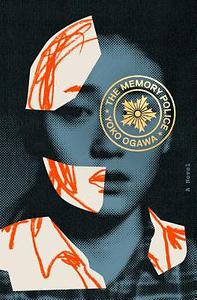Take a photo of a barcode or cover
This novel is set on an island, governed by a dystopian group called The Memory Police. On this island, things suddenly disappear, innocuous items to begin with, like ribbon, bells & stamps, but then things of increasing significance like boats, novels, even seasons. The inhabitants know something has been disappeared when they wake, & whatever it is must be destroyed - once it’s gone, so too are their memories of it. A young novelist whose Mother was taken by the Memory Police, discovers that her publisher, R, is one of the rare few islanders who can withstand the disappearing memories, & with the help of a dear family friend, referred to affectionately as the ‘old man’, secrets him within a hidden room of the house she inherited from her late parents. Will they manage to evade the ever growing presence of the Memory Police, & what will be disappeared next? I particularly enjoyed the sub-story running throughout, excerpts shared from the novel the narrator is writing, about a typist who loses her voice & becomes imprisoned in a church tower. Dystopian fiction can be oh so wonderful when done well, & I thought this was really excellent, a haunting, fascinating read.
dark
mysterious
slow-paced
Plot or Character Driven:
Character
mysterious
sad
slow-paced
Plot or Character Driven:
A mix
listening in audiobook was a bit confusing to differentiate her writing and the main plot, it took an embarrassing amount of time for the to click for me
mysterious
reflective
sad
tense
medium-paced
Plot or Character Driven:
Plot
Strong character development:
No
Loveable characters:
Complicated
Diverse cast of characters:
No
Flaws of characters a main focus:
No
emotional
mysterious
reflective
sad
slow-paced
Plot or Character Driven:
A mix
Strong character development:
Yes
Loveable characters:
Yes
Diverse cast of characters:
No
Flaws of characters a main focus:
N/A
when i say the characters are loveable I don’t mean R’s shady ass
Not what I was expecting, but fantastic for what it is. A solid mood read (the mood being quiet and ominous) that makes you look around and reflect on the things that make up our lives.
A simply written yet somewhat poetic anti-utopia that way better than many others portaits how a system erodes a person's identity and even dismembers them. The ending is quite impressive and dismal, as it should (?) be.
Where do I start with this book? Let's try the beginning. I started reading this book on May 1st, 2022. I had heard so much about Ogawa's work and was very excited to finally give her a try. The premise was genuinely intriguing. I found myself utterly fascinated by the setting in the beginning and could not stop reading. I thought the main character was a bit passive, but her voice fit the world so exceptionally; as would be the case with one who is incapable of retaining memories. The concept of the memory police is also very interesting. I wanted nothing more than to explore their intentions and motivations, their mechanics and ideology, but I also saw that an explanation is not necessary if the story served a certain theme that did not rely on any explosive revelations.
Moving forward, I found the plot meandering into nothingness. Nameless characters floating about a narrative so intangible in scope that I felt an urge to stop reading after every page. However, I forced myself to continue.
*Spoilers ahead*
I finished it on January 29th, 2025. This is the book that almost broke my never DNF rule. I despise it with every fiber of my being. R is such a despicable person. He left his PREGNANT wife in an attempt to retain his safety. He values his own life more so than that of his child. When everyone's left legs disappeared, did he not think for a second that his wife might not even be able to hold their own baby? When every other body part was disappearing, did he not think that his child might not have breast milk available to consume and subsequently succumb to death? All he cared about was the forced romance he had with our main character, who herself also failed to think of the family she was destroying in the process. The old man was the only breath of fresh air throughout this story.
Ogawa was so focused on giving us a story about the importance of memory retention and the machinations of a slow agonizing death through disappearance that she forgot that a concept does not birth a novel. Why intoduce a totalitarian policing entity if you're not going to explore any facet within it? Why create such an intriguing world when you're not going to explore why it exists? An impactful throughline would have excused such lazy writing, but even something as simple as a message or moral was missing.
All the shortcomings in this book made more sense once I found out Ogawa is a Zionist apologist. Having her characters be subservient to a higher power that can not and does not have any form of justification for their actions is her way of propagating an ideology lacking ideals and ideas of resistance to injustice and oppression.
Even the story within our story served no purpose as it crescendos in a very similar fashion to the main story, with subservience being the throughline by the end.
She had the potential and power to say so much with her story but ended up saying absolutely nothing. What a shame such a concept fell into the hands of an author that could not do it any justice.
With every new disappearance, I lost intrigue and interest in this book, and just like the memories of our main character, I hope the words within this novel disappear from my memory.
Moving forward, I found the plot meandering into nothingness. Nameless characters floating about a narrative so intangible in scope that I felt an urge to stop reading after every page. However, I forced myself to continue.
*Spoilers ahead*
I finished it on January 29th, 2025. This is the book that almost broke my never DNF rule. I despise it with every fiber of my being. R is such a despicable person. He left his PREGNANT wife in an attempt to retain his safety. He values his own life more so than that of his child. When everyone's left legs disappeared, did he not think for a second that his wife might not even be able to hold their own baby? When every other body part was disappearing, did he not think that his child might not have breast milk available to consume and subsequently succumb to death? All he cared about was the forced romance he had with our main character, who herself also failed to think of the family she was destroying in the process. The old man was the only breath of fresh air throughout this story.
Ogawa was so focused on giving us a story about the importance of memory retention and the machinations of a slow agonizing death through disappearance that she forgot that a concept does not birth a novel. Why intoduce a totalitarian policing entity if you're not going to explore any facet within it? Why create such an intriguing world when you're not going to explore why it exists? An impactful throughline would have excused such lazy writing, but even something as simple as a message or moral was missing.
All the shortcomings in this book made more sense once I found out Ogawa is a Zionist apologist. Having her characters be subservient to a higher power that can not and does not have any form of justification for their actions is her way of propagating an ideology lacking ideals and ideas of resistance to injustice and oppression.
Even the story within our story served no purpose as it crescendos in a very similar fashion to the main story, with subservience being the throughline by the end.
She had the potential and power to say so much with her story but ended up saying absolutely nothing. What a shame such a concept fell into the hands of an author that could not do it any justice.
With every new disappearance, I lost intrigue and interest in this book, and just like the memories of our main character, I hope the words within this novel disappear from my memory.
challenging
emotional
mysterious
reflective
sad
medium-paced
Plot or Character Driven:
A mix
Strong character development:
N/A
Loveable characters:
Yes
Diverse cast of characters:
N/A
Flaws of characters a main focus:
No
challenging
dark
mysterious
reflective
sad
slow-paced
Plot or Character Driven:
A mix
Strong character development:
Yes
Loveable characters:
Yes
Diverse cast of characters:
No
Flaws of characters a main focus:
Complicated






